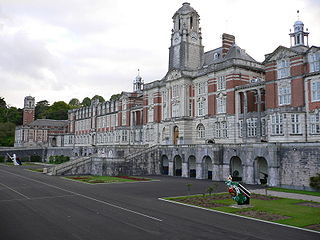
Britannia is the national personification of Britain as a helmeted female warrior holding a trident and shield. An image first used in classical antiquity, the Latin Britannia was the name variously applied to the British Isles, Great Britain, and the Roman province of Britain during the Roman Empire. Typically depicted reclining or seated with spear and shield since appearing thus on Roman coins of the 2nd century AD, the classical national allegory was revived in the early modern period. On coins of the pound sterling issued by Charles II of England, Scotland, and Ireland, Britannia appears with her shield bearing the Union Flag. To symbolise the Royal Navy's victories, Britannia's spear became the characteristic trident in 1797, and a helmet was added to the coinage in 1825.

Bristol Cars was a British Manufacturer of hand-built luxury cars headquartered in Bristol, England. It was formed from the car division of the Bristol Aeroplane Company after the Second World War and later became independent as Bristol Cars Limited. After being placed in receivership and being taken over in 2011, it entered liquidation in February 2020.

Her Majesty's Yacht Britannia, also known as the Royal Yacht Britannia, is the former royal yacht of the British monarchy. She was in service from 1954 until 1997. She was the 83rd such vessel since King Charles II acceded to the throne in 1660, and is the second royal yacht to bear the name, the first being the racing cutter built for the Prince of Wales in 1893. During her 43-year career, the yacht travelled more than a million nautical miles around the world to more than 600 ports in 135 countries. Now retired from royal service, Britannia is permanently berthed at Ocean Terminal, Leith in Edinburgh, Scotland, where it is a visitor attraction with over 300,000 visits each year.

The Bristol Type 175 Britannia is a retired British medium-to-long-range airliner built by the Bristol Aeroplane Company in 1952 to fly across the Commonwealth. During development two prototypes were lost and the turboprop engines proved susceptible to inlet icing, which delayed entry into service while solutions were sought.

The Bristol Proteus was the Bristol Engine Company's first mass-produced gas turbine engine design, a turboprop that delivered just over 4,000 hp (3,000 kW). The Proteus was a reverse-flow gas turbine. Because the second turbine drove no compressor stages, but only the propeller, this engine was classified as a free-turbine. It powered the Bristol Britannia airliner, small naval patrol craft, hovercraft and electrical generating sets. It was also used to power a land-speed record car, the Bluebird-Proteus CN7. After the merger of Bristol with Armstrong Siddeley the engine became the Bristol Siddeley Proteus, and later the Rolls-Royce Proteus. The Proteus was to have been superseded by the Bristol Orion which would have given a Britannia a 75% increase in power for cruising faster.

Britannia Royal Naval College (BRNC), commonly known as Dartmouth, is the naval academy of the United Kingdom and the initial officer training establishment of the Royal Navy. It is located on a hill overlooking the port of Dartmouth, Devon, England. Royal Naval officer training has taken place in Dartmouth since 1863. The buildings of the current campus were completed in 1905. Earlier students lived in two wooden hulks moored in the River Dart. Since 1998, BRNC has been the sole centre for Royal Naval officer training.
Britannia Row Studios was a recording studio located in Islington, London N1 (1975–1995), and then Fulham, London SW6, England (1995–2015).

HMS Britannia was a King Edward VII-class pre-dreadnought battleship of the Royal Navy. She was named after Britannia, the Latin name of Great Britain under Roman rule. The ship was built by Portsmouth Dockyard between 1904 and 1906. Armed with a battery of four 12-inch (305 mm) and four 9.2 in (234 mm) guns, she and her sister ships marked a significant advance in offensive power compared to earlier British battleship designs that did not carry the 9.2 in guns.

Britannia is a group of neighbourhoods in Bay Ward in the west end of Ottawa, Ontario, Canada. It is located on the Ottawa River across from Aylmer, Quebec, adjacent to its namesake, Britannia Bay, north of Richmond Road, west of the Kichi Zibi Mikan and east of Boyce Avenue. The total population of this area was 6,692 as of the 2016 census. The area constituted a municipal ward from 1973 to 1994.

Britannia Industries Limited is an Indian Multinational FMCG company specialised in food industry, part of the Wadia Group headed by Nusli Wadia. Founded in 1892 and headquartered in Kolkata, it is one of India's oldest existing companies and best known for its biscuit products. The company sells its Britannia brands of biscuits, breads and dairy products throughout India and abroad. Beginning with the circumstances of its takeover by the Wadia Group in the early 1990s, the company has been mired in several controversies connected to its management. However, it still has a large market share and it is profitable.
Pengam is a former coal village and community in the Rhymney Valley, Caerphilly county borough, in Wales. It is also a community, containing itself and the nearby village of Fleur de Lys, and at the 2001 census it has a population of 3,842, rising slightly to 3,848 at the 2011 Census.

Dubris, also known as Portus Dubris and Dubrae, was a port in Roman Britain on the site of present-day Dover, Kent, England.

North Quay is an approved office development, consisting of three towers on the north side of Canary Wharf in London. The developer is Canary Wharf Group and the architect is Cesar Pelli.

Britannia Points Halt railway station was a short-lived conditional stop on the Romney, Hythe and Dymchurch Railway in Kent, England, for about two years from the start of 1929 to approximately 1930.
Ottawa Electric Railway Company was a streetcar public transit system in the city of Ottawa, Canada, part of the electric railway streetcars that operated between 1891 and 1959. Ottawa once had tracks through downtown on Rideau Street, Sparks Street and others, and extended outside of the downtown core to provide services that helped form communities such as Westboro, Old Ottawa South and The Glebe. Prior to this, starting in 1866, public transportation was provided by Ottawa City Passenger Railway Company, a horse-drawn tram service. The O.E.R. was taken over by the Ottawa Transportation Commission in 1948, which was itself succeeded by OC Transpo in 1973.
The British Academy Britannia Awards are presented by BAFTA Los Angeles, a branch of the British Academy of Film and Television Arts (BAFTA), as "a bridge between the Hollywood and British production and entertainment business communities." Established in 1989, it honours "individuals and companies who have dedicated their careers or corporate missions to advancing the art-forms of the moving image."

Milecastle 31 (Carrawburgh) was a milecastle of the Roman Hadrian's Wall. Its remains exist as a turf covered platform beside (and partially covered by) the B6318 Military Road, just to the east of Carrawburgh fort (adjoining the car park).

The Britannia Yacht Club (BYC) is a private social club, yacht club, and tennis club based in Britannia, a neighborhood in Ottawa, Ontario, Canada. It was founded in 1887 by a group of cottagers.

Stepneyville is a suburb of Nelson, New Zealand.

Britannia is a British/American historical fantasy drama television show. It was created by Jez Butterworth and Tom Butterworth. The show was the first co-production between Sky and Amazon Prime Video and stars Kelly Reilly, David Morrissey, Zoë Wanamaker, Mackenzie Crook, Nikolaj Lie Kaas, and Eleanor Worthington Cox. It first aired on Sky Atlantic in the UK beginning 18 January 2018 and on Amazon Prime Video in the US beginning 26 January 2018. The first series aired on Epix beginning 2 August 2020. Pop songs were used as theme music for the three series to date: Donovan's "Hurdy Gurdy Man", his "Season of the Witch", and "Children of the Revolution" by T. Rex. In March 2023, the series was cancelled after three seasons.
















